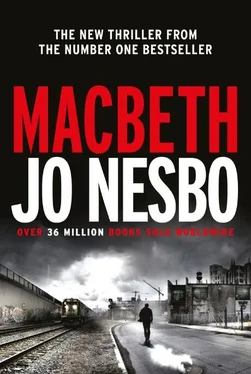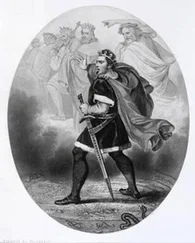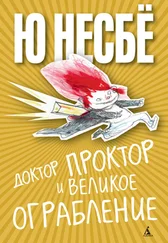‘Macbeth doesn’t,’ Hecate said. ‘But she does.’
‘She?’
‘Lady, his beloved dominatrix. I’ve never met her, yet I know her innermost secrets and understand her better than I understand you, Strega. All Lady needs is time to reach the inescapable conclusion. Believe me.’
‘Which is?’
‘That Duncan has to be got rid of.’
‘And then?’
‘Then,’ Hecate said, tapping his stick on the ground, tap-tap . ‘The good times will roll again.’
‘Are you sure we can control Macbeth? Now he’s clean he’s probably... moralistic, isn’t he?’
‘My dear Strega, the only person more predictable than a junkie or a moralist is a love-smitten junkie and moralist.’
Banquo lay in the bedroom on the first floor listening to the rain, to the silence in the room, to the train that never came. The railway track ran past outside, and he visualised the wet, glistening gravel where some of the rails and the sleepers had been removed. Well, stolen. They had been happy here, he and Vera. They’d had good times. He had met Vera while she was working for the goldsmith Jacobs & Sons, where the finer folk went to buy wedding rings and gifts for each other. One evening the burglar alarm went off, and Banquo — who was on patrol — arrived on the spot, sirens howling, within a minute. Inside, a terrified young woman was desperately shouting over the ear-piercing bell that she was only closing up, she was new and must have done something wrong when she was putting the alarm on. He had only caught the odd word here and there and had had all the more time to observe her. And when eventually she burst into tears he had put a gentle, consoling arm around her. She felt like a warm, tremulous, fledgling bird. During the next few weeks they went to the cinema, walked on the sunny side of the tunnel and he had kissed her at the gate. She came from a working-class family and lived at home. Right from a young girl she’d had to make a contribution and had worked at the Estex factory like her parents. Until she got a bad cough, unofficial advice from a doctor to work elsewhere and a job at Jacobs via recommendations.
‘The pay’s worse,’ she said, ‘but you live longer.’
‘You still cough?’
‘Only on rainy days.’
‘We’d better make sure you get more sunshine. Another walk on Sunday?’
After six months Banquo went to the jeweller’s shop and asked her if she had an engagement ring she could recommend. She looked so bewildered he had to laugh.
After getting married they moved into a poky two-bed flat, with neighbours beneath them on the ground floor. They had saved up for, bought and made love in the bed where he was lying now. Out of consideration for their neighbours, Vera — who was a passionate but shy woman — would wait for a train until she came. When a train thundered past, shaking the walls and ceiling lamps, she let herself go, screamed and dug her nails into his back. She did the same when she gave birth to Fleance in that very bed — waited until the train came and then screamed, dug her nails into his hand and squeezed out a son.
They bought the ground floor the following year to have more room. There were three of them and could soon be many more. But five years later there were only two of them: a boy and a man. It was her lungs. The doctors blamed the polluted air, all the toxins from the factories forced down by low-pressure weather systems hovering over the town like a lid. And with lungs that were already damaged... Banquo blamed himself. He hadn’t been able to scrape enough money together to move the family to the other side of the tunnel, to Fife, to somewhere with a bit of sunshine and fresh air you could breathe.
Now they had too much room. He could hear the radio on downstairs and knew Fleance was doing his schoolwork. Fleance was conscientious, he wanted so much to do well. It was some consolation that those who found school easy and got off to a good start often lost their enthusiasm when life became tougher. And then students like Fleance, who was forced to employ strict working routines and knew that learning required effort, got their turn. Yes, it would all be fine. And, who knows, perhaps the boy would meet a girl and start a family. Here in this house, for example. Perhaps new and better times were coming. Perhaps they would be able to help Duncan even more, now that Macbeth was in charge of fighting organised crime in this town. The news had come as a huge surprise to Banquo and most at HQ. Down in the SWAT cellar Ricardo had put it bluntly: he couldn’t imagine Macbeth and Banquo sitting behind their desks in suits and ties. Drawing diagrams and presenting budgets. Or making polite conversation at cocktail parties with chief commissioners, council members and other fine folk. But they would see. There wouldn’t be any lack of will. And perhaps it was now the turn of people like Macbeth, who were used to having to put in a shift, to achieve their aims.
There was no one else at HQ apart from Duff who knew how addicted to speed Macbeth had been when he was a teenager, how crazy it had made him, how hopelessly lost he had been. Banquo had been on the beat, tramping round the rain-lashed streets, when he came across the boy curled up on a bench in a bus shelter, out of his head on dope. He woke him, wanting to move him on, but there was something about his pleading brown eyes. Something in his alert movements when he stood up, something about his fit, compact body that told Banquo he was going to waste. Something that might have been developing. Something that could still be saved. Banquo took the fifteen-year-old home that night, got him some dry clothes. Vera fed him and they put him to bed. The next day, a Sunday, Vera, Banquo and the boy drove through the tunnel, came out into sunshine on the other side and went for a long walk in the green hills. Macbeth talked with a stammer at first, then less so. He had grown up in an orphanage and dreamed about working in a circus. He showed them how he could juggle and then took five paces from a tall oak and threw Banquo’s penknife into the tree, where it quivered. The boy found it more difficult to show them the scars on his forearm and talk about them. That didn’t happen until later, when he knew Banquo and Vera were people he could trust. Even then he only said it had started after he fled the home, not how or what triggered it. After that there were more Sundays, more conversations and walks. But Banquo remembered the first especially well because Vera had whispered to him on the way home, ‘Let’s make a son like him.’ And when, four years later, a proud Banquo had accompanied Macbeth to police college, Fleance had been three and Macbeth clean for just as long.
Banquo turned and looked at the photograph on the bedside table. It was of him and Fleance; they were standing under the dead apple tree in the garden. Fleance’s first day at police college. He was wearing his uniform, it was early morning, the sun was out, and the shadow of the photographer fell across them.
He heard a chair scrape and Fleance stomping around. Angry, frustrated. It wasn’t always easy to grasp everything straight off. It took time to acquire understanding. Like it took time and willpower to renounce drugs, the escape you had become so addicted to. Like it took time to change a town, to redress injustice, to purge the saboteurs, the corrupt politicians and the big-time criminals, to give the town’s citizens air they could breathe.
It had all gone quiet downstairs. Fleance was back at his desk.
It was possible if you took one day at a time and did the work that was required. Then one day the trains might run again.
He listened. All he heard was silence. And rain. But if he closed his eyes, wasn’t that Vera’s breathing beside him in bed?
Читать дальше












